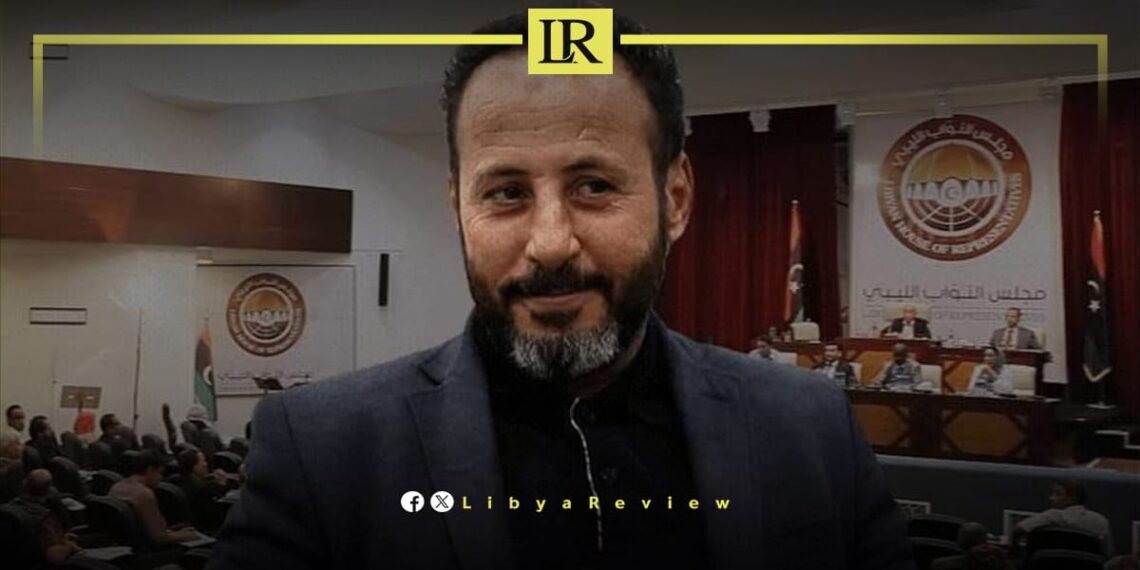Abdul Moneim Al-Arfi, a member of the Libyan House of Representatives, urged the High Council of State to advance the formation of a unified government or enact election laws.
In a critical statement on Libya Alhadath TV, he emphasized that the United Nations mission is currently engaging with all parties to formulate a consensus that bridges differing perspectives and addresses the ongoing crises, particularly the division within the State Council.
Al-Arfi expressed the urgent need to halt the continuing tenure of the interim Prime Minister, Abdel-Hamid Dbaiba, whose term has expired, citing widespread corruption and systematic plundering conducted by Dbaiba’s government. He highlighted the government’s role in draining the nation’s wealth, which has led to a budget deficit, potentially delaying salaries and affecting other financial aspects.
He stressed the necessity of preventing the current government from further exploiting Libya’s resources, indicating a dire need for immediate action to curb these practices and restore national integrity.
Libya has been in chaos since a NATO-backed uprising toppled longtime leader Muammar Gaddafi in 2011. The county has for years been split between rival administrations.
Libya’s economy, heavily reliant on oil, has suffered due to the ongoing conflict. The instability has led to fluctuations in oil production and prices, impacting the global oil market and Libya’s economy.
The conflict has led to a significant humanitarian crisis in Libya, with thousands of people killed, and many more displaced. Migrants and refugees using Libya as a transit point to Europe have also faced dire conditions.
The planned elections for December 2021 were delayed due to disagreements over election laws and the eligibility of certain candidates. This delay has raised concerns about the feasibility of a peaceful political transition.
Despite the ceasefire, security remains a significant concern with sporadic fighting and the presence of mercenaries and foreign fighters. The unification of the military and the removal of foreign forces are crucial challenges.Abdul Moneim Al-Arfi, a member of the Libyan House of Representatives, urged the High Council of State to advance the formation of a unified government or enact election laws.
In a critical statement on Libya Alhadath TV, he emphasized that the United Nations mission is currently engaging with all parties to formulate a consensus that bridges differing perspectives and addresses the ongoing crises, particularly the division within the State Council.
Al-Arfi expressed the urgent need to halt the continuing tenure of the interim Prime Minister, Abdel-Hamid Dbaiba, whose term has expired, citing widespread corruption and systematic plundering conducted by Dbaiba’s government. He highlighted the government’s role in draining the nation’s wealth, which has led to a budget deficit, potentially delaying salaries and affecting other financial aspects.
He stressed the necessity of preventing the current government from further exploiting Libya’s resources, indicating a dire need for immediate action to curb these practices and restore national integrity.
Libya has been in chaos since a NATO-backed uprising toppled longtime leader Muammar Gaddafi in 2011. The county has for years been split between rival administrations.
Libya’s economy, heavily reliant on oil, has suffered due to the ongoing conflict. The instability has led to fluctuations in oil production and prices, impacting the global oil market and Libya’s economy.
The conflict has led to a significant humanitarian crisis in Libya, with thousands of people killed, and many more displaced. Migrants and refugees using Libya as a transit point to Europe have also faced dire conditions.
The planned elections for December 2021 were delayed due to disagreements over election laws and the eligibility of certain candidates. This delay has raised concerns about the feasibility of a peaceful political transition.
Despite the ceasefire, security remains a significant concern with sporadic fighting and the presence of mercenaries and foreign fighters. The unification of the military and the removal of foreign forces are crucial challenges.


